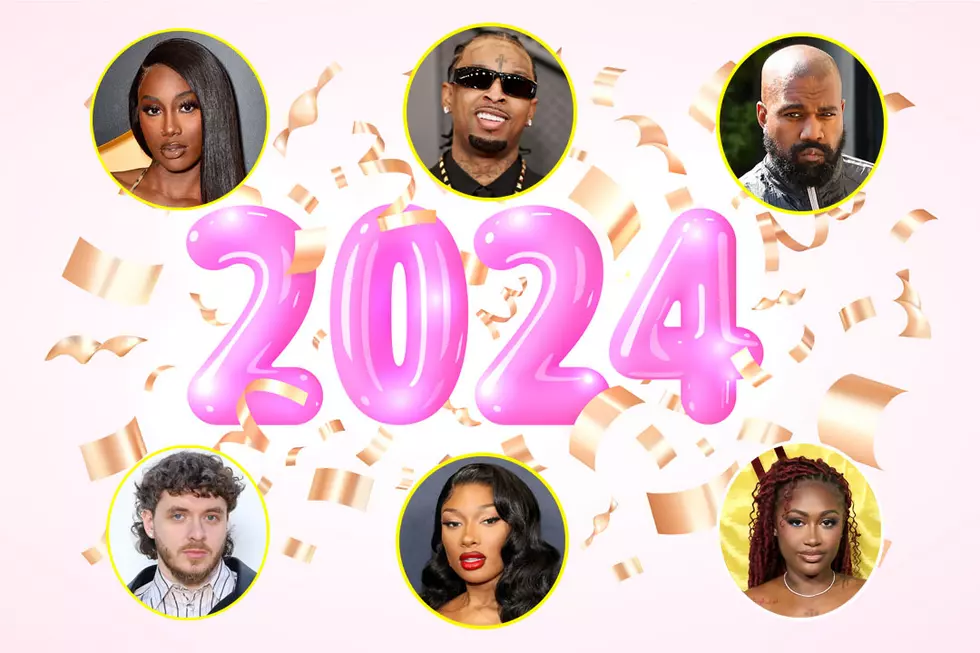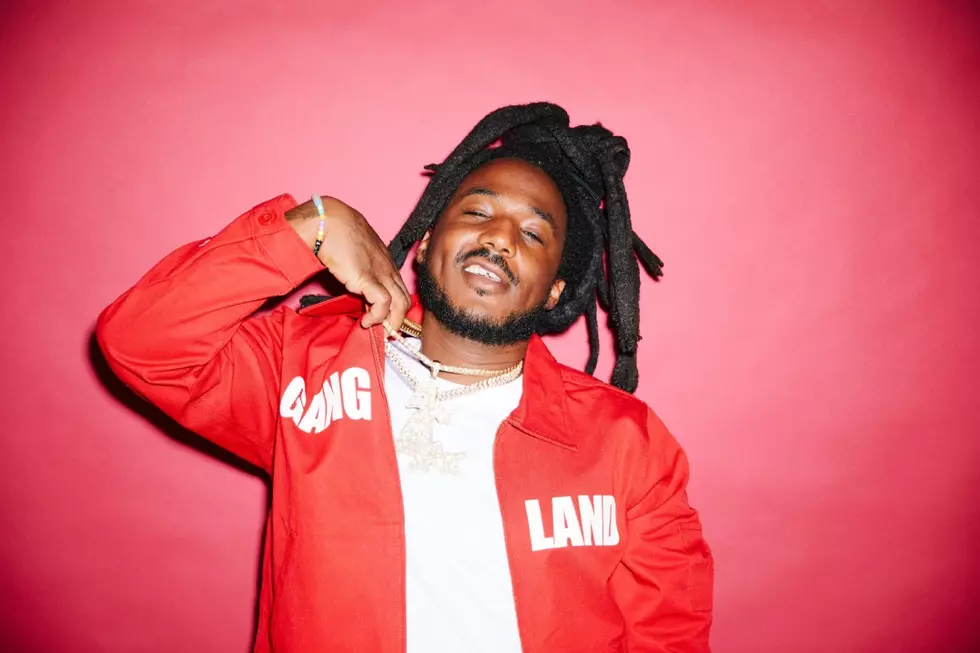
De La Soul’s Trugoy Remembers Their Debut Album 25 Years Later
25 years ago, De La Soul landed a monumental debut with 3 Feet High & Rising. Trugoy The Dove, alongside Posdnuos, P.A. Mase and Prince Paul, challenged the rules of hip-hop by contrasting the day's prominent battle raps and boasts with a more playful style. The risk paid off, and their 1989 album won over many rap fans with storytelling and eclectic sounds, as well as hits like “The Magic Number,” “My, Myself & I” and “Potholes In My Lawn.” Boasting 23 tracks and the likes of Jungle Brothers and Q-Tip, 3 Feet High & Rising still stands the test of time today.
To celebrate the anniversary, we spoke to Trugoy for Classic Material in our April/May issue featuring Eminem, Jimmy Iovine and Dr. Dre on the cover. Below are outtakes of the interview that discuss the recording process of 3 Feet High & Rising, the role of Prince Paul, being marketed as the hippies of hip-hop and whether we’ll see another album from the legendary group in the future.—Eric Diep
On first recording 3 Feet High & Rising:
Trugoy: I believe I was 19. We were young. Mase was actually still in high school. [We were] going on tour and having a tutor, taking exams on the road. Or being flown on the road to take an exam. Yeah, we were young. I was in my second year of anniversary. Pos was in his first year, and we were just kids, man. Recording it, we were even younger. I think I was probably my first year out of high school and then finally when it was realized, it might have been a year and a half later. We were fairly young.
On making an album that was different:
We didn’t compare anything to a Kane or LL or Slick Rick or anyone. We did our thing, obviously. We wanted the acceptance. We wanted to able to be “rap stars.” Of course, there’s a dream that we wanted to be huge and successful in the game. But, in regards to our music, we just listened to everybody from the harder, more edged stuff at that time. N.W.A even. D.O.C. And for us, it was like, “Okay, we love this, but we are going to do our own thing.” We never felt that in any way. “You gotta sound like or you have to compare to or you have to outdo.” In some cases, we did when it came to styles and lyrics and stuff like that. We listened to Rakim, and we listened to KRS-One. It was like, “Okay, we gotta step our game up.” In regards to competition and where we felt like we landed in the game or where we would land or who we were, we never felt any intimidation or any like what could we do better than who or what. Never felt that way.
I think what was happening was everybody was either battle rapping or boast rapping. I think that was probably the biggest thing in hip-hop at the time. PE, of course, is exceptional as well as maybe KRS-One, but even KRS and BDP it was all about battling. For the most part, people were making records boasting from LL to Steady B to Mo B. Dick and everybody. Everybody was just battling and boast rapping. And for us, we loved that, but we aren’t battling anybody. We don’t have any beef. We don’t have any adversaries out there or anything like that. Let’s talk about what we do. We have fun. We kid around. We joke. We’re clown,s and we are kids. Why even try to play tough guys or play man or whatever the case may be. We’re kids out of high school having a good time, so it was what it was.
On having an open-door policy in the studio:
It wasn’t a situation where we were tainted by the industry. When we went into the studio, it wasn’t like close the doors. You know, it’s only supposed to be the A&Rs there or what have you. It was like, our doors are open so if you walked off the street or you just family and friends. Or, you were just another act down the hall—doors are open. We constantly left that door open because it only fed our imagination and our creativity just bringing other people into it. It expanded us.
Again, whether it was the janitor down the hall and we wanted to use his voice for something because he sounded like something or if it was a woman on the phone and we invited her in because her phone voice sounded good and it would be perfect for the skit. Or, if it was the Jungle Brothers and Q-Tip and Latifah rolling in just after a show because we wanted to hang out and wind up doing a song like “Buddy,” it was no rules in regards to who was invited to our sessions. Our sessions were open door. I mean, it was everybody. Like, everybody. Like, Brand Nubian, Beatnutz, Leaders Of The New School, Cam B., Biz. It was always an open door, and I think that’s what led to our innocence as well. Growing as people and picking up things just on the spur. Just like at the drop of a dime. You said something or your voice … Even when we had Russell Simmons in there one time hanging out, listening to stuff, we threw him on “Saturdays” 'cause it just felt good. I think that was important to us. Just always having an open door.
On the role of Prince Paul:
Prince Paul was quite important, man. From day one, he saw something in the group. Whether it was artistically, musically or whether it was a business move for him, it doesn’t matter. He was somebody that was quite important to everything that we did. Of course, Prince Paul played the role of producer, mentor, what have you. It doesn’t ring the truth all the way, but we was okay with that. He didn’t produce everything. He wasn’t the only one putting the beats together. It was more of us putting the beats together. And Paul basically seasoning them and adding a little bit here and there. The respect [comes from] the fact that he was already in the game doing it. And then allowing us to come and be a part of what he was doing and then having our own space with him and teaching us along the way. That was most important. He was important in those regards, being an actual mentor to the word. Showing us the way. Teaching us right from wrong. Giving us advice as to how things could be or could change or what have you. The grow process in recording and even being in artists and being people, he was very instrumental.
On being pushed as the hippies of hip-hop:
Looking back now, I really appreciated it and respected it. I think the label had a vision and think that the media ran with something that worked. If you want to sell a record or if you want to sell a magazine or whatever it is you want to sell, you are going to obviously run with what the hook is. I think we left that up to the label and everyone else. We just concentrated on what’s next in regards to creativity. I would've probably felt a little disappointed in myself or ourselves if we would've ran with the hippie thing ourselves. But, you gotta consider that these other entities and the other elements of this game, they have a strategy and a goal as well. I think that strategy and goal gave us the opportunity to do everything that followed after that. Had it not been, we probably could have repeated the hippie image for the next record and would've been wiped out just at that point. I’m grateful for it.
Again, maybe 15 years ago, I might have answered different and been like, “Yeah, I hated that hippie thing.” But when you look 25 years back, I realized it had a part to the cycle, to the longevity and to the length of this. It really had its part, and I am glad that those involved—label and media—did what they did. It was important for our career as well.
On making another De La Soul album:
I think we will not stop making music. God willin’ we are still alive and healthy. It’s never gonna end. We constantly are recording. And unfortunate enough, people don’t get wind of it or hear it or get an opportunity to own it themselves. We record. And if it’s not me, Pos and Mase [are] recording together. I’m doing songs. Pos is working on music. And we will continue to do that. De La Soul will never break up. It’s never going to be a Dave solo album because the group is no longer together or Pos or what have you. We’ll probably release music bits here and there. Us individually. It isn’t going nowhere. As long as it can go, it will.
More From XXL









